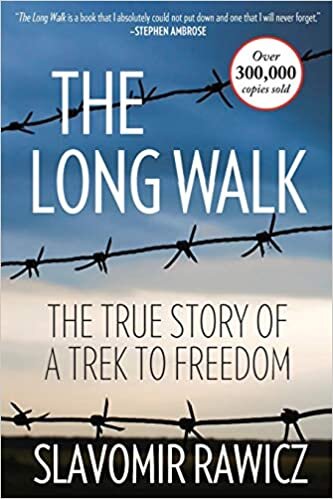The Long Walk

The Long Walk
by Slavomir Rawicz
$16.95; 245 pages
A classic adventure story, a tale of endurance and survival, The Long Walk [Amazon link] is the story of a Polish officer who escaped from a Siberian Gulag and walked to India.
Whilst doing research for this review, I discovered that another man claimed that Rawicz had stolen his story. Witold Glinski says that the events in The Long Walk actually happened to him. Glinski claims Rawicz read an account of his voyage in the Polish embassy in London, and based the book on that recollection. In retrospect, this explains the curious character of the book. The book is incredible, but too incredible to be fake. There is just something about the book that rings true. But nonetheless, the book has a dreamy character, with strange bits that probably are the result of Rawicz making things up that he didn't really know. Reading Glinski's account makes much more sense of the things that happened, the flow is better, and nothing seems out of place.
Accusations had been leveled against Rawicz from the moment the book was published, but the BBC discovered evidence that Rawicz was in fact serving with the Polish Army after being released from the gulag during the time the events in the book occurred.
Despite all that, I liked this book. Given that it does seem to be based upon true events, it is still worth a read, even if it wasn't Rawicz who actually walked to India. There are a couple interesting things in the book that I noted. One thing that came to mind only because I am reading The Science of Conjecture by James Franklin, is the Soviets had a strange insistence upon obtaining confessions. Rawicz/Glinsky spent several months in the Lubyanka prison while the NKVD was attempting to obtain his confession. In retrospect, this seems strange. Why bother? There was not really any danger of a popular uprising in the WWII period, they did not need to obtain confessions.
However, going back to the 10th century in Continental Law, there was a preference for confession above all other forms of proof in legal cases, due to the difficulty of interpretation of other kinds of evidence. Confession was felt to be unambiguous in ways that other kinds of testimony were not, primarily for religious reasons. This struck me as funny, in a perverse way, that the Soviets insisted on confessions for their show trials when the ultimate reason for doing so traces back to the Torah.
This book is also excellent for the sense of the vast emptiness it effectively creates. Central Asia has a whole lotta nothing going on, and this book will make that impression stick in your mind. Unlike most reviewers who either like it because they think it is true, or hate it because they think it is a hoax, I think this book is worth a read even though it is demonstrably a hoax, because it is nonetheless tied to real events, and it can give you an interesting view of the Soviet Union from the WWII period.



Comments ()